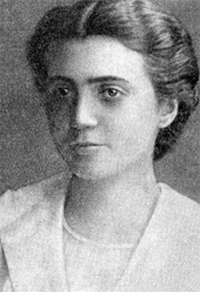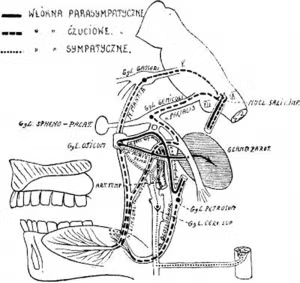
Lucja Frey, 1919
Lucja Frey was born in 1889 in the Lemberg region of what was then the Austro–Hungarian Empire (which is now part of the Ukraine). While the education avaiable for girls was very limited at that time, her parents allowed her to continue her education through medical school.
Explore This Issue
August 2016In 1923, Dr. Frey published the description of one case of an auriculo-temporal syndrome, which later became known as ‘‘Frey syndrome.” Although some communications of an auriculo-temporal syndrome had been published earlier, Dr. Frey was the first to complete the entire description of anatomy pathology supposed pathogenesis and suggestions for treatment of the phenomenon.
Unlike her predecessors, Dr. Frey precisely described the constellation of symptoms in gustatory sweating, including warmth, flushing, sweating, and altered tactile sensation. She was the first to define gustatory sweating as a disorder of both sympathetic and parasympathetic innervations. Following the fact that physiologic secretion of the parotid gland is determined by both parasympathetic and sympathetic fibers, Dr. Frey carried on her drug experiments with pilocarpine, atropine, adrenalin, and physostigmine amyl nitrate and observed differences between both affected and unaffected sides of face.
She also noted that the thickness of excreted saliva depended mainly on which specific part of an autonomic nervous system is being stimulated. She explained that the secretion of ‘‘more liquid’’ or ‘‘thicker and scarcer’’ saliva at the unaffected and affected side of face, respectively, with the stimulation of parasympathetic and sympathetic neuronal fibers.
Based on this observation she concluded that an affected reflex arch of gustatory sweating produced an “irritation syndrome.” Frey recognized the adversely regenerated auriculo-temporal nerve as a reasonable factor for the syndrome and proposed it as the missing link between eating, gustatory stimulation, and facial sweating. In addition, she said, ‘‘Hyperaesthesia of all modes of sensitivity, redness, increased temperature, and perspiration, occurred each time the rear part of lingual mucosa was stimulated.”
World War II
In 1941, the Germans organized a Jewish ghetto for the region Dr. Frey lived in, and Dr. Frey was employed as a physician in one of the ghetto’s clinics. It remains unclear whether she was killed by a firing squad along with many of her patients on August 20, 1942, or whether she was moved to a concentration camp. However, she did not survive the war.
